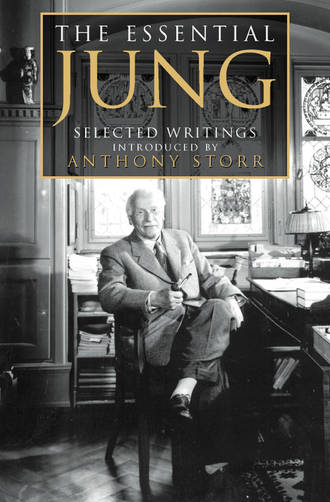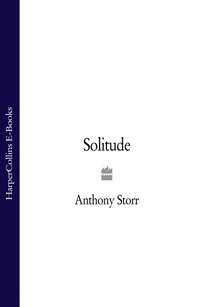
Полная версия
The Essential Jung: Selected Writings
One aspect of this phenomenon, the absence of emotional rapport, will be well known to you, as this is a striking disturbance of the reality function. By dint of much psychoanalytic work with these patients we established that this lack of adaptation to reality is compensated by a progressive increase in the creation of fantasies, which goes so far that the dream world becomes more real for the patient than external reality. Schreber found an excellent figurative description for this phenomenon in his delusion about the “end of the world.” He thus depicts the loss of reality in a very concrete way. The dynamic explanation is simple: we say that libido has withdrawn more and more from the external world into the inner world of fantasy, and there had to create, as a substitute for the lost world, a so-called reality equivalent. This substitute is built up piece by piece, so to speak, and it is most interesting to see out of what psychological material this inner world is constructed.
This way of looking at the displacement of libido is based on the everyday use of the term, its original, purely sexual connotation being very rarely remembered. In actual practice we speak simply of libido, and this is understood in so innocuous a sense that Claparède once remarked to me that one could just as well use the word “interest.” The customary use of the term has developed, quite naturally and spontaneously, into a usage which makes it possible to explain Schreber’s end of the world simply as a withdrawal of libido. On this occasion Freud remembered his original sexual definition of libido and tried to come to terms with the change of meaning that had quietly taken place in the meantime. In his paper on Schreber he asks himself whether what the psychoanalytic school calls libido and conceives as “interest from erotic sources” coincides with interest in general. You see that, putting the problem in this way, Freud asks himself the question which Claparède had already answered in practice.
Freud thus broaches the question of whether the loss of reality in schizophrenia, to which I drew attention in my “Psychology of Dementia Praecox,” is due entirely to the withdrawal of erotic interest, or whether this coincides with objective interest in general. We can hardly suppose that the normal “fonction du réel” (Janet) is maintained solely by erotic interest. The fact is that in very many cases reality disappears altogether, so that not a trace of psychological adaptation can be found in these patients. (In these states reality is replaced by complex contents.) We are therefore compelled to admit that not only the erotic interest, but all interest whatsoever, has got lost, and with it the whole adaptation to reality.
Earlier, in my “Psychology of Dementia Praecox,” I tried to get round this difficulty by using the expression “psychic energy,” because I could not base the theory of dementia praecox on the theory of displacements of libido sexually defined. My experience – at that time chiefly psychiatric – did not permit me to understand this latter theory: only later did I come to realize its partial correctness as regards the neuroses, thanks to increased experiences in the field of hysteria and obsessional neurosis. Abnormal displacements of libido, quite definitely sexual, do in fact play a great role in these illnesses. But although very characteristic repressions of sexual libido do take place in the neuroses, the loss of reality so typical of dementia praecox never occurs. In dementia praecox the loss of the reality function is so extreme that it must involve the loss of other instinctual forces whose sexual character must be denied absolutely, for no one is likely to maintain that reality is a function of sex. Moreover, if it were, the withdrawal of erotic interest in the neuroses would necessarily entail a loss of reality comparable to that which occurs in dementia praecox. But, as I said before, this is not the case.
(Another thing to be considered – as Freud also pointed out in his work on the Schreber case – is that the introversion of sexual libido leads to an investment of the ego which might conceivably produce that effect of loss of reality. It is indeed tempting to explain the psychology of the loss in this way. But when we examine more closely the various things that can arise from the withdrawal and introversion of sexual libido, we come to see that though it can produce the psychology of an ascetic anchorite, it cannot produce dementia praecox. The anchorite’s whole endeavour is to exterminate every trace of sexual interest, and this is something that cannot be asserted of dementia praecox.*)
These facts have made it impossible for me to apply Freud’s libido theory to dementia praecox. I am also of the opinion that Abraham’s essay on this subject is theoretically untenable from the standpoint of Freud’s conception of libido. Abraham’s belief that the paranoid system, or the schizophrenic symptomatology, is produced by the withdrawal of sexual libido from the outside world cannot be justified in terms of our present knowledge. For, as Freud has clearly shown, a mere introversion or regression of libido invariably leads to a neurosis and not to dementia praecox. It seems to me impossible simply to transfer the libido theory to dementia praecox, because this disease shows a loss of reality which cannot be explained solely by the loss of erotic interest.
THE GENETIC CONCEPTION OF LIBIDO
The attitude of reserve which I adopted towards the ubiquity of sexuality in my foreword to “The Psychology of Dementia Praecox,” despite the fact that I recognized the psychological mechanisms pointed out by Freud, was dictated by the position of the libido theory at that time. Its sexual definition did not permit me to explain functional disturbances which affect the indefinite sphere of the hunger drive just as much as that of sex solely in the light of a sexual libido theory. Freud’s libido theory had long seemed to me inapplicable to dementia praecox. In my analytical work I noticed that, with growing experience, a slow change in my conception of libido had taken place. Instead of the descriptive definition set forth in Freud’s Three Essays, there gradually took shape a genetic definition of libido, which enabled me to replace the expression “psychic energy” by “libido.”
A very important divergence of view with Freud was over the question of incest. Freud, with his insistence on the literal, believed that neurosis was connected with the persistence of incestuous desires connected with the Oedipus complex. As a previous extract demonstrated, Jung believed that incestuous fantasies were not causal factors in neurosis, but became reactivated as a result of regression in the face of a failure of adaptation in the present. He also began to realize that regression might be a necessary prelude to finding a new and better adaptation. Incest, therefore, could have the symbolic significance of a new synthesis taking place within the individual which pointed toward a creative solution to his problems.
From “Sigmund Freud” MDR, p. 162/167
When I was working on my book about the libido and approaching the end of the chapter “The Sacrifice,” I knew in advance that its publication would cost me my friendship with Freud. For I planned to set down in it my own conception of incest, the decisive transformation of the concept of libido, and various other ideas in which I differed from Freud. To me incest signified a personal complication only in the rarest cases. Usually incest has a highly religious aspect, for which reason the incest theme plays a decisive part in almost all cosmogonies and in numerous myths. But Freud clung to the literal interpretation of it and could not grasp the spiritual significance of incest as a symbol. I knew that he would never be able to accept any of my ideas on this subject.
I spoke with my wife about this, and told her of my fears. She attempted to reassure me, for she thought that Freud would magnanimously raise no objections, although he might not accept my views. I myself was convinced that he could not do so. For two months I was unable to touch my pen, so tormented was I by the conflict. Should I keep my thoughts to myself, or should I risk the loss of so important a friendship? At last I resolved to go ahead with the writing – and it did indeed cost me Freud’s friendship.
In the following passage, Jung elaborates the idea that regression occurs when inner conflict prevents the individual’s adaptation to the external world. He goes on to show that the unconscious contents reactivated by regression contain the germs of a new and better adaptation. (The balance of opposites and the notion of compensation which Jung touches on in the passage below will be reviewed in more detail later.)
From “On Psychic Energy” CW 8, pars. 60–9
FUNDAMENTAL CONCEPTS OF THE LIBIDO THEORY
Progression and Regression
One of the most important energic phenomena of psychic life is the progression and regression of libido. Progression could be defined as the daily advance of the process of psychological adaptation. We know that adaptation is not something that is achieved once and for all, though there is a tendency to believe the contrary. This is due to mistaking a person’s psychic attitude for actual adaptation. We can satisfy the demands of adaptation only by means of a suitably directed attitude. Consequently, the achievement of adaptation is completed in two stages: (1) attainment of attitude, (2) completion of adaptation by means of the attitude. A man’s attitude to reality is something extraordinarily persistent, but the more persistent his mental habitus is, the less permanent will be his effective achievement of adaptation. This is the necessary consequence of the continual changes in the environment and the new adaptations demanded by them.
The progression of libido might therefore be said to consist in a continual satisfaction of the demands of environmental conditions. This is possible only by means of an attitude, which as such is necessarily directed and therefore characterized by a certain one-sidedness. Thus it may easily happen that an attitude can no longer satisfy the demands of adaptation because changes have occurred in the environmental conditions which require a different attitude. For example, a feeling-attitude that seeks to fulfil the demands of reality by means of empathy may easily encounter a situation that can only be solved through thinking. In this case the feeling-attitude breaks down and the progression of libido also ceases. The vital feeling that was present before disappears, and in its place the psychic value of certain conscious contents increases in an unpleasant way; subjective contents and reactions press to the fore and the situation becomes full of affect and ripe for explosions. These symptoms indicate a damming up of libido, and the stoppage is always marked by the breaking up of the pairs of opposites. During the progression of libido the pairs of opposites are united in the coordinated flow of psychic processes. Their working together makes possible the balanced regularity of these processes, which without this inner polarity would become one-sided and unreasonable. We are therefore justified in regarding all extravagant and exaggerated behaviour as a loss of balance, because the coordinating effect of the opposite impulse is obviously lacking. Hence it is essential for progression, which is the successful achievement of adaptation, that impulse and counter-impulse, positive and negative, should reach a state of regular interaction and mutual influence. This balancing and combining of pairs of opposites can be seen, for instance, in the process of reflection that precedes a difficult decision. But in the stoppage of libido that occurs when progression has become impossible, positive and negative can no longer unite in coordinated action, because both have attained an equal value which keeps the scales balanced. The longer the stoppage lasts, the more the value of the opposed positions increases; they become enriched with more and more associations and attach to themselves an ever-widening range of psychic material. The tension leads to conflict, the conflict leads to attempts at mutual repression, and if one of the opposing forces is successfully repressed a dissociation ensues, a splitting of the personality, or disunion with oneself. The stage is then set for a neurosis. The acts that follow from such a condition are uncoordinated, sometimes pathological, having the appearance of symptomatic actions. Although in part normal, they are based partly on the repressed opposite which, instead of working as an equilibrating force, has an obstructive effect, thus hindering the possibility of further progress.
The struggle between the opposites would persist in this fruitless way if the process of regression, the backward movement of libido, did not set in with the outbreak of the conflict. Through their collision the opposites are gradually deprived of value and depotentiated. This loss of value steadily increases and is the only thing perceived by consciousness. It is synonymous with regression, for in proportion to the decrease in value of the conscious opposites there is an increase in the value of all those psychic processes which are not concerned with outward adaptation and therefore are seldom or never employed consciously. These psychic factors are for the most part unconscious. As the value of the subliminal elements and of the unconscious increases, it is to be expected that they will gain influence over the conscious mind. On account of the inhibiting influence which the conscious exercises over the unconscious, the unconscious values assert themselves at first only indirectly. The inhibition to which they are subjected is a result of the exclusive directedness of conscious contents. (This inhibition is identical with what Freud calls the “censor.”) The indirect manifestation of the unconscious takes the form of disturbances of conscious behaviour. In the association experiment they appear as complex-indicators, in daily life as the “symptomatic actions” first described by Freud, and in neurotic conditions they appear as symptoms.
Since regression raises the value of contents that were previously excluded from the conscious process of adaptation, and hence are either totally unconscious or only “dimly conscious,” the psychic elements now being forced over the threshold are momentarily useless from the standpoint of adaptation, and for this reason are invariably kept at a distance by the directed psychic function. The nature of these contents is for all the world to read in Freudian literature. They are not only of an infantile-sexual character, but are altogether incompatible contents and tendencies, partly immoral, partly unaesthetic, partly again of an irrational, imaginary nature. The obviously inferior character of these contents as regards adaptation has given rise to that depreciatory view of the psychic background which is habitual in psychoanalytic writings.* What the regression brings to the surface certainly seems at first sight to be slime from the depths; but if one does not stop short at a superficial evaluation and refrains from passing judgment on the basis of a preconceived dogma, it will be found that this “slime” contains not merely incompatible and rejected remnants of everyday life, or inconvenient and objectionable animal tendencies,but also germs of new life and vital possibilities for the future.* This is one of the great merits of psychoanalysis, that it is not afraid to dredge up the incompatible elements, which would be a thoroughly useless and indeed reprehensible undertaking were it not for the possibilities of new life that lie in the repressed contents. That this is and must be so is not only proved by a wealth of practical experience but can also be deduced from the following considerations.
The process of adaptation requires a directed conscious function characterized by inner consistency and logical coherence. Because it is directed, everything unsuitable must be excluded in order to maintain the integrity of direction. The unsuitable elements are subjected to inhibition and thereby escape attention. Now experience shows that there is only one consciously directed function of adaptation. If, for example, I have a thinking orientation I cannot at the same time orient myself by feeling, because thinking and feeling are two quite different functions. In fact, I must carefully exclude feeling if I am to satisfy the logical laws of thinking, so that the thought-process will not be disturbed by feeling. In this case I withdraw as much libido as possible from the feeling process, with the result that this function becomes relatively unconscious. Experience shows, again, that the orientation is largely habitual; accordingly the other unsuitable functions, so far as they are incompatible with the prevailing attitude, are relatively unconscious, and hence unused, untrained, and undifferentiated. Moreover, on the principle of coexistence they necessarily become associated with other contents of the unconscious, the inferior and incompatible quality of which I have already pointed out. Consequently, when these functions are activated by regression and so reach consciousness, they appear in a somewhat incompatible form, disguised and covered up with the slime of the deep.
If we remember that the stoppage of libido was due to the failure of the conscious attitude, we can now understand what valuable seeds he in the unconscious contents activated by regression. They contain the elements of that other function which was excluded by the conscious attitude and which would be capable of effectively complementing or even of replacing the inadequate conscious attitude. If thinking fails as the adapted function, because it is dealing with a situation to which one can adapt only by feeling, then the unconscious material activated by regression will contain the missing feeling function, although still in embryonic form, archaic and undeveloped. Similarly, in the opposite type, regression would activate a thinking function that would effectively compensate the inadequate feeling.
By activating an unconscious factor, regression confronts consciousness with the problem of the psyche as opposed to the problem of outward adaptation. It is natural that the conscious mind should fight against accepting the regressive contents, yet it is finally compelled by the impossibility of further progress to submit to the regressive values. In other words, regression leads to the necessity of adapting to the inner world of the psyche.
Just as adaptation to the environment may fail because of the one-sidedness of the adapted function, so adaptation to the inner world may fail because of the one-sidedness of the function in question. For instance, if the stoppage of libido was due to the failure of the thinking attitude to cope with the demands of outward adaptation, and if the unconscious feeling function is activated by regression, there is only a feeling attitude towards the inner world. This may be sufficient at first, but in the long run it will cease to be adequate, and the thinking function will have to be enlisted too, just as the reverse was necessary when dealing with the outer world. Thus a complete orientation towards the inner world becomes necessary until such time as inner adaptation is attained. Once the adaptation is achieved, progression can begin again.
The principle of progression and regression is portrayed in the myth of the whale-dragon worked out by Frobenius, as I have shown in detail in my book Symbols of Transformation (pars. 307ff.). The hero is the symbolical exponent of the movement of libido. Entry into the dragon is the regressive direction, and the journey to the East (the “night sea journey”) with its attendant events symbolizes the effort to adapt to the conditions of the psychic inner world. The complete swallowing up and disappearance of the hero in the belly of the dragon represents the complete withdrawal of interest from the outer world. The overcoming of the monster from within is the achievement of adaptation to the conditions of the inner world, and the emergence (“slipping out”) of the hero from the monster’s belly with the help of a bird, which happens at the moment of sunrise, symbolizes the recommencement of progression.
It is characteristic that the monster begins the night sea journey to the East, i.e., towards sunrise, while the hero is engulfed in its belly. This seems to me to indicate that regression is not necessarily a retrograde step in the sense of a backwards development or degeneration, but rather represents a necessary phase of development. The individual is, however, not consciously aware that he is developing; he feels himself to be in a compulsive situation that resembles an early infantile state or even an embryonic condition within the womb. It is only if he remains stuck in this condition that we can speak of involution or degeneration.
* It might be objected that dementia praecox is characterized not only by the introversion of sexual libido but also by a regression to the infantile level, and that this constitutes the difference between the anchorite and the schizophrenic. This is certainly correct, but it would still have to be proved that in dementia praecox it is regularly and exclusively the erotic interest which goes into a regression. It seems to me rather difficult to prove this, because erotic interest would then have to be understood as the “Eros” of the old philosophers. But that can hardly be meant. I know cases of dementia praecox where all regard for self-preservation disappears, but not the very lively erotic interests.
* Somewhat after the manner of Hudibras, whose opinion is quoted by Kant (Träume eines Geistersehers, III): “When a hypochondriacal wind is roaring in the bowels, everything depends on the direction it takes. If it goes downwards, it turns into a fart, but if it mounts upwards, it is a vision or a divine inspiration.”
* Though professional satiety with neurotic unrealities makes the analyst sceptical, a generalized judgment from the pathological angle has the disadvantage of being always biased.
Part 3. The Development of the Idea of the Collective Unconscious and of Archetypes
Jung’s deep involvement with schizophrenic patients and his endeavour to understand their psychology led him to conclude that their fantasies and delusional systems could not be explained in terms of their personal biographies.
From “Recent Thoughts on Schizophrenia” CW 3, par. 549
But unlike the contents of a neurosis, which can be satisfactorily explained by biographical data, psychotic contents show peculiarities that defy reduction to individual determinants, just as there are dreams where the symbols cannot be properly explained with the aid of personal data. By this I mean that neurotic contents can be compared with those of normal complexes, whereas psychotic contents, especially in paranoid cases, show close analogies with the type of dream that the primitive aptly calls a “big dream.” Unlike ordinary dreams, such a dream is highly impressive, numinous, and its imagery frequently makes use of motifs analogous to or even identical with those of mythology. I call these structures archetypes because they function in a way similar to instinctual patterns of behaviour. Moreover, most of them can be found everywhere and at all times. They occur in the folklore of primitive races, in Greek, Egyptian, and ancient Mexican myths, as well as in the dreams, visions, and delusions of modern individuals entirely ignorant of all such traditions.
As an example of the kind of observation which led him to this conclusion, Jung quotes a particular case.
From “The Structure of the Psyche” CW 8, pars. 317–21





